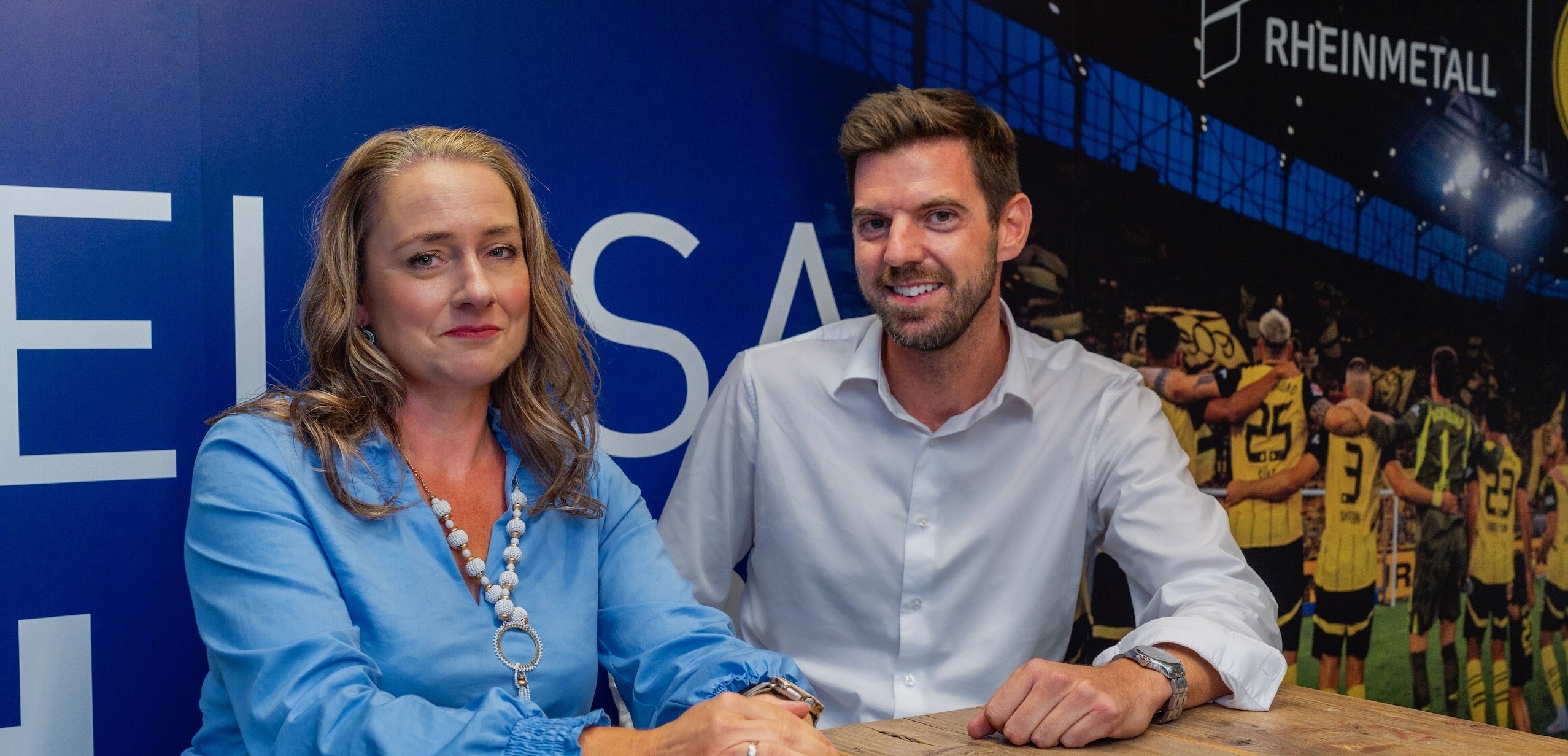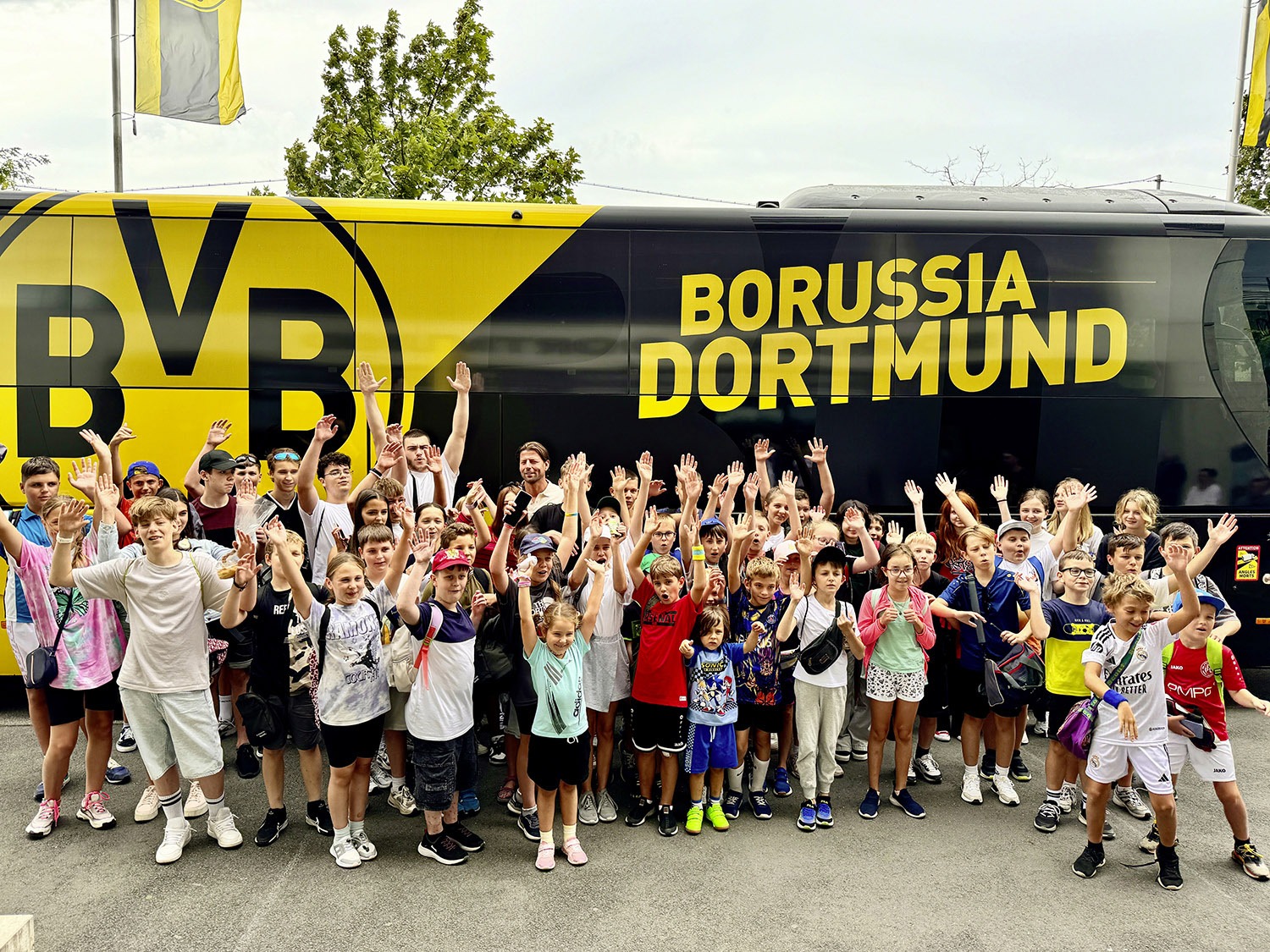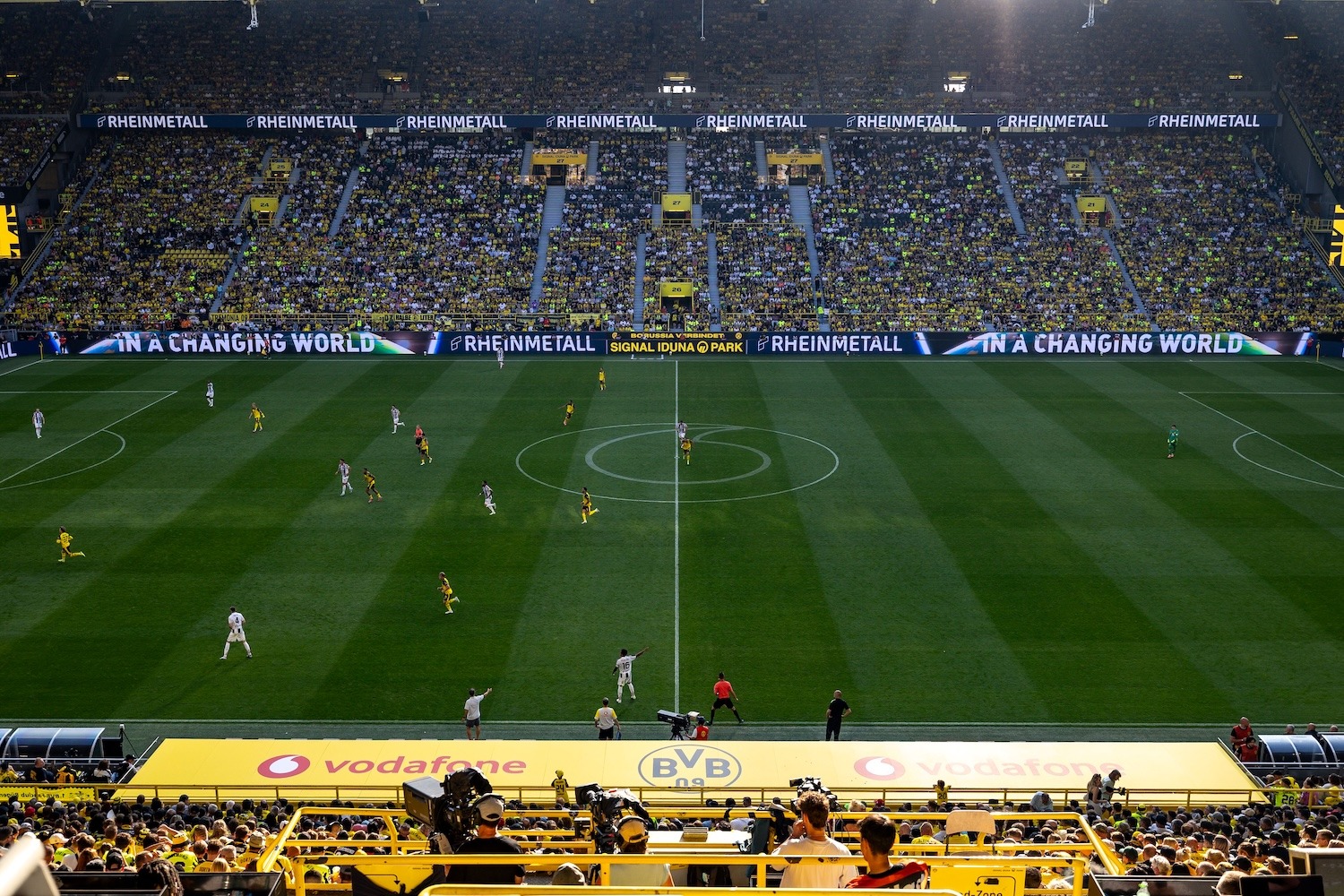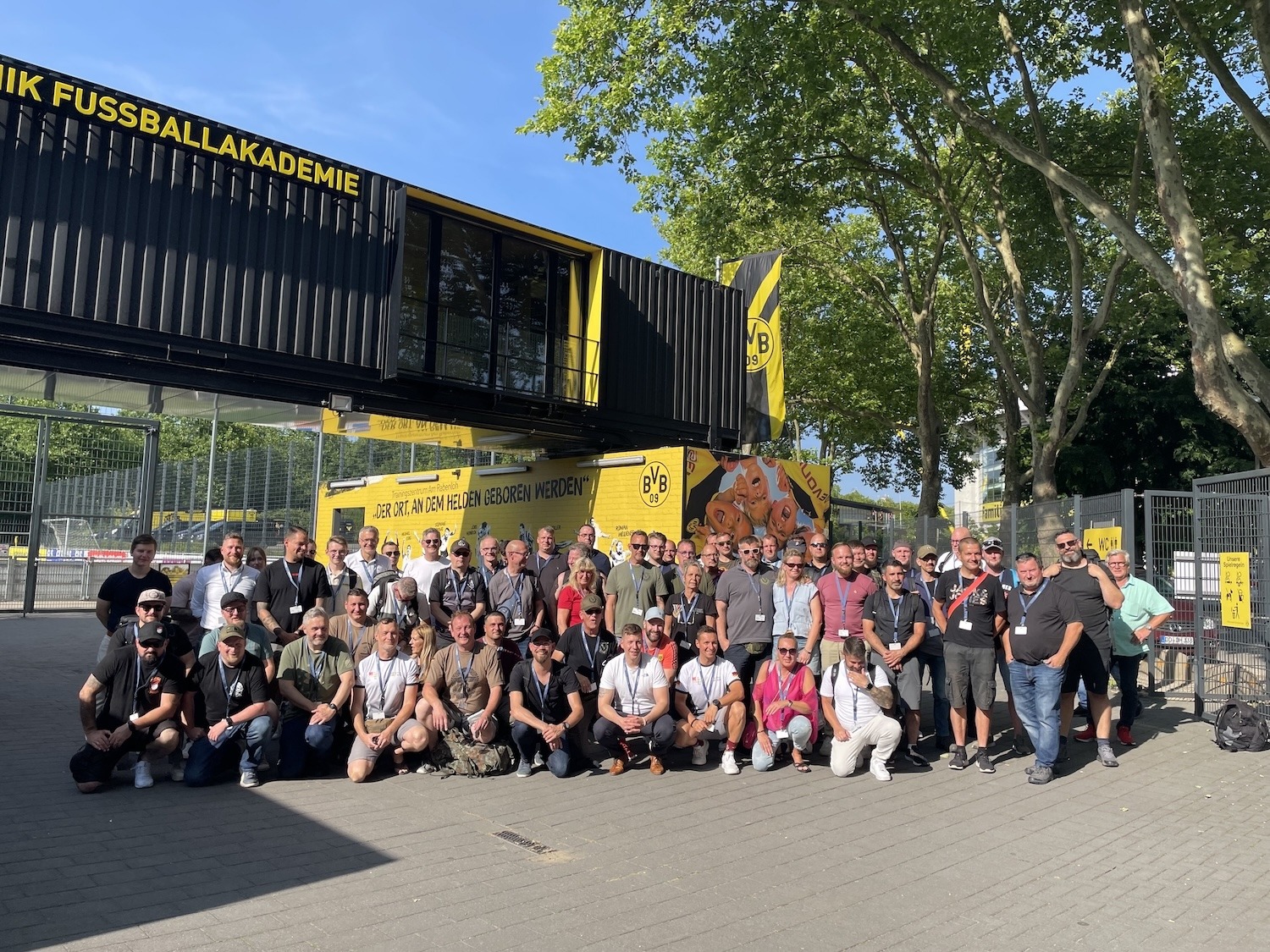
Good question
27. August 2025

7. October 2025
Social commitment, fairness and health promotion: The partnership between Rheinmetall and Borussia Dortmund is far more than traditional sports sponsorship. Caroline-Ann Schmitz, Vice President Corporate Health Solutions at Rheinmetall, and Christian Diercks, Managing Director of the BVB Evonik Football Academy, look back on a year of cooperation.

Corporate health management
At Rheinmetall, people are the focus: health is not only a personal value, but also a decisive factor in the company’s success. Only those who are healthy, motivated, and well-trained can reach their full potential – today more than ever. The focus is on a holistic, needs- and target group-oriented concept with the aim of promoting the physical, mental, and emotional health and fitness as well as the general well-being of employees in the long run. Health management not only contributes to the health and satisfaction of everyone but also strengthens the corporate culture and well-being in the workplace.
What makes the collaboration with BVB so special for Rheinmetall?
Caroline-Ann Schmitz: We work with Borussia Dortmund in a wide variety of areas as we have many points of contact and shared values. At Rheinmetall, we have been operating a comprehensive health management system with the appropriate structures in place for more than a decade. This means, among other things, that we actively promote the physical and mental health of our employees in a holistic manner. The cooperation with BVB ideally complements our work in this area.
Christian Diercks: Borussia Dortmund is much more than just a professional soccer team—it has over 1,200 employees who contribute their expertise. This diversity is what makes our partnerships so strong. We don’t work with a set formula, but rather develop customized solutions tailored to the needs of our partners. We always ask ourselves: How can we as a club have an impact on society? And how can we work with our partners to generate momentum?
The partnership has now been in place for over a year. What have been your favourite moments together?
Caroline-Ann Schmitz: It’s hard to say – I think all of our projects are great. The trainee health days are particularly close to my heart. At the start of the training program, we organize project days together with BVB and other partners focusing on exercise, mental strength, and healthy eating. It’s valuable for us as a company to communicate these topics. But when Christian Diercks and his team from the BVB Evonik Football Academy are there, the content takes on a whole new dimension. And when former BVB pros send video messages of congratulations and emphasize how important it is to stay physically and mentally fit, we reach our trainees on a much deeper level.

BVB Evonik Football Academy
The aim of the BVB Evonik Football Academy is to enable football enthusiasts of all ages – regardless of their skill level – to enjoy the sport, to provide excellent support for children’s football, and to lay the foundations for the youth training center, but also to have an impact on society. With a global network of 52 academies and partners, some of which cooperate with former or current BVB professionals in their home countries, the academy promotes not only athletic skills, but also personal development, team spirit, and social skills. It represents what Borussia Dortmund is all about, even beyond professional soccer: social commitment and the teaching of values on and off the field.
Christian, what was your personal highlight?
Christian Diercks: The Blue-Yellow Cross with Ukrainian children from Kharkiv, Kherson, and Zaporizhzhia coming to visit was particularly moving. They had to leave their homes because of Russia’s war of aggression. Together with Rheinmetall, we wanted to make a statement with an adventure day in Dortmund – and return a little bit of normality and joy to the children. The partnership made it possible to give these young people a little break. This shows the social added value we can create together.
Rheinmetall has been involved in health management for quite some time. What new perspectives does BVB bring to the partnership?
Caroline-Ann Schmitz: As a responsible employer, the health of our employees is very important to us. Job applicants also ask specifically about health services. The partnership with BVB opens up new opportunities for us: our health days and campaigns, which we have been organizing for years, are given a whole new dynamic by the presence of prominent BVB legends, coaches, and nutrition experts. Not only do they contribute their expertise, but they also attract a great deal of attention. This allows us to reach those who have not been particularly concerned with health issues in the past.
You not only work with professional players and those who want to become one, but also with children and young people in popular sports as part of the BVB Evonik Football Academy. These are all people who enjoy sports anyway. But how do you manage to motivate adults, perhaps even those who are not particularly interested in sports?
Christian Diercks: It’s true that children and young people are easier to inspire. But appealing to adults on an emotional level is crucial. We want to promote a positive image of sports – not just football. Our professional players and coaches are credible ambassadors. With the BVB logo on their chests, they immediately enjoy a high level of acceptance. I’ve been to Australia recently, where we cooperate with the German International School Sydney. There, I saw how naturally people of all ages exercise in the mornings—with a smile on their faces. Eighty-year-olds doing yoga together on the beach – that made a deep impression on me. I thought: that’s exactly what I want to achieve here. Exercise shouldn’t be seen as a chore, but as something enjoyable.
Has the cooperation with BVB changed the attention to and acceptance of your health offerings and services?
Caroline-Ann Schmitz: Definitely. Sports and exercise not only motivate physically, but also promote cohesion, team spirit, and resilience – social skills that are extremely important in everyday working life. When a BVB expert or club legend gives a talk at our company, their name alone attracts attention. Many may initially come to meet the person – and then happen to hear a lecture on health. If that’s what opens the door, we’ve achieved our goal. As Christian said, it’s about people taking responsibility for their own well-being out of their own motivation. We offer structures and strategies – but personal responsibility has to grow.
Our ‘Rh Active’ triathlon is deliberately designed to be accessible to everyone. It’s not about performance, but about the time spent exercising. So, we are looking for the team at our locations worldwide that spends the most minutes in one, two, or all three disciplines—walking, swimming, or cycling. The distance covered or the speed are completely irrelevant. The three most successful locations receive trophies made by our trainees themselves. The cash prizes go directly to health management at the respective location. The absolute highlight: BVB organizes a customized event on site for the winner. If that’s not motivation, what is?


How do you measure the success of your health management program at Rheinmetall? Are there any key figures that can be used to measure this?
Caroline-Ann Schmitz: Rheinmetall is growing quickly – demand for our products is high, and capacity utilization is correspondingly intense. At the same time, demand for our health services is increasing. I see this as a shift in thinking: our employees recognize that health is their most important asset. And that is a key encouraging aspect.
Christian Diercks: It’s about changing perspectives. We see that Borussia Dortmund is not only successful as a club, but also capable of raising awareness for issues in such a way that people are willing to change their usual behavioural patterns. If we manage to convey the ideas of exercise and health not as chores, but as an opportunity, we will be successful and make a real contribution considering the social responsibility we bear.
Would you agree with this conclusion? Health promotion works particularly well when it touches people. With credible ambassadors, authentic stories, and a common goal: taking responsibility for a healthier society.
Caroline-Ann Schmitz: We would both agree with that.
Christian Diercks: Absolutely!
Click here to receive push notifications. By giving your consent, you will receive constantly information about new articles on the Dimensions website. This notification service can be canceled at any time in the browser settings or settings of your mobile device. Your consent also expressly extends to the transfer of data to third countries. Further information can be found in our data protection information under section 5.